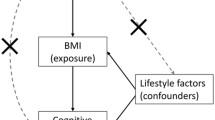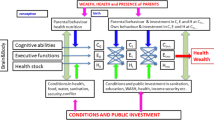Abstract
Childhood health is by now recognized to influence future educational and economic outcomes. Children who experience poorer childhood health have significantly lower educational attainment, poorer health, and lower socioeconomic status as adults (Case et al. 2005; Currie 2009). For example, Case and Paxson (2008) investigated the relationship between height (as indicator for early health and socio-economic status), cognitive functions and health status at older ages and found that taller individuals (considered to be healthier and wealthier during childhood) have greater cognitive skills on average, report significantly fewer difficulties with activities of daily living, and are in considerably better physical and mental health.
Access this chapter
Tax calculation will be finalised at checkout
Purchases are for personal use only
Similar content being viewed by others
References
Case, A., Fertig, A., & Paxson, C. (2005). The lasting impact of childhood health and circumstance. Journal of Health Economics, 24(2), 365–389.
Case, A., & Paxson, C. (2008). Height, health and cognitive function at older ages. American Economic Review Papers and Proceedings, 98(2), 463–467.
Christelis, D., Jappelli, T., & Padula, M. (2010). Cognitive abitilies and portfolio choice. European Economic Review, 54(1), 18–38.
Currie, J. (2009). Healthy, wealthy, and wise: Socioeconomic status, poor health in childhood, and human capital development. Journal of Economic Literature, 47(1), 87–122.
Heckman, J. J., Stixrud, J., & Urzua, S. (2006). The effects of cognitive and noncognitive abilities on labor market outcomes and social behavior. Journal of Labor Economics, 24(3), 411–482.
Jürges, H. (2007). True health vs. response styles: Exploring cross-country differences in self-reported health. Health Economics, 16(2), 163–178.
Rosen, H., & Wu, S. (2004). Portfolio choice and health status. Journal of Financial Economics, 72(3), 457–484.
Author information
Authors and Affiliations
Corresponding author
Editor information
Editors and Affiliations
Rights and permissions
Copyright information
© 2011 Springer-Verlag Berlin Heidelberg
About this chapter
Cite this chapter
Christelis, D., Dobrescu, L., Motta, A. (2011). The Impact of Childhood Health and Cognition on Portfolio Choice. In: Börsch-Supan, A., Brandt, M., Hank, K., Schröder, M. (eds) The Individual and the Welfare State. Springer, Berlin, Heidelberg. https://doi.org/10.1007/978-3-642-17472-8_5
Download citation
DOI: https://doi.org/10.1007/978-3-642-17472-8_5
Published:
Publisher Name: Springer, Berlin, Heidelberg
Print ISBN: 978-3-642-17471-1
Online ISBN: 978-3-642-17472-8
eBook Packages: Humanities, Social Sciences and LawSocial Sciences (R0)




